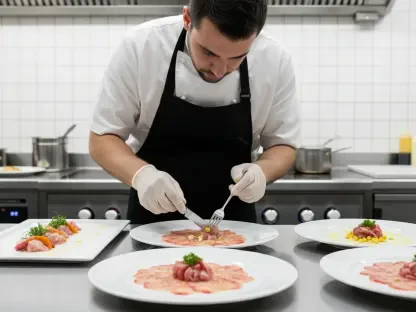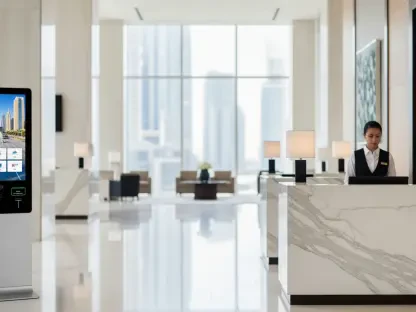What does it take to achieve a staggering 9.4% EBITDA growth in a global economy fraught with uncertainty, currency fluctuations, and shifting travel demands? In the first half of this year, Accor, a titan in the hospitality industry, reported an impressive €552 million in EBITDA, surpassing market expectations and setting a benchmark for resilience. This remarkable feat in the face of a €69 million currency headwind invites a closer look into the strategies and decisions that propelled this growth, offering a glimpse into the inner workings of a company navigating a complex landscape with finesse.
The significance of Accor’s performance extends far beyond its balance sheets. This achievement signals a robust recovery and adaptability within the hospitality sector, reflecting broader trends such as the resurgence of luxury travel and the power of a diversified brand portfolio. For investors, industry stakeholders, and even travelers, this growth underscores the potential for innovation and stability in an unpredictable market, highlighting why Accor’s success is a story worth exploring in depth.
Unveiling a Hospitality Powerhouse’s Winning Formula
Accor’s financial triumph in the first half of the year is not just a number on a report—it’s the result of calculated moves and an unwavering focus on market dynamics. With total revenue climbing to €2,745 million, a 2.5% increase from last year (and 5.1% at constant currency), the company has demonstrated its ability to thrive despite external pressures. This performance paints a picture of a hospitality leader adept at balancing growth with operational challenges.
A key element of this success lies in the company’s ability to manage costs while capitalizing on high-demand segments. The Premium, Midscale, and Economy division posted a steady €1,475 million in revenue, while the Luxury & Lifestyle segment soared with a 5.6% rise to €1,312 million. These figures reflect a strategic emphasis on varied offerings that cater to diverse traveler needs, ensuring stability across different market conditions.
Beyond the numbers, Accor’s story is one of bold expansion and adaptability. The landmark addition of Treasure Island in Las Vegas, with 2,884 keys, marks the company’s largest hotel globally and a significant step into the North American market. This move exemplifies how strategic geographic diversification can bolster financial outcomes, even amidst a volatile global economy.
Why This Growth Resonates in Today’s Market
In an era marked by geopolitical tensions and fluctuating exchange rates, Accor’s financial upswing carries significant implications for the broader hospitality landscape. A 9.4% EBITDA increase isn’t merely a corporate milestone; it’s a beacon of how adaptability can turn challenges into opportunities. This performance highlights the industry’s potential to rebound and innovate, even when faced with economic headwinds.
The surge in luxury travel demand, particularly evident in Accor’s Luxury & Lifestyle division with a 7.0% RevPAR growth in Q2, points to a shifting consumer preference toward premium experiences. Regions like Turkey, Egypt, and the United Arab Emirates have emerged as hotspots for resort destinations, driving this upward trend. Such patterns suggest that travelers are prioritizing value and exclusivity, a trend that Accor has skillfully leveraged to fuel its gains.
Moreover, this growth sends a reassuring signal to investors and industry leaders about the viability of diversified portfolios. By balancing its offerings across various price points and geographies, Accor mitigates risks tied to regional downturns or currency depreciation. This approach not only secures financial stability but also positions the company as a model for navigating market volatility with confidence.
Dissecting the Pillars of Financial Excellence
A closer examination of Accor’s results reveals distinct drivers behind the 9.4% EBITDA growth. Revenue per Available Room (RevPAR) stands out as a critical metric, with the Premium, Midscale, and Economy division achieving a 2.9% increase in Q2, largely driven by pricing power (75% of the growth). Meanwhile, the Luxury & Lifestyle segment outpaced with a 7.0% RevPAR rise, balancing both price and occupancy gains, especially in high-performing markets like the UAE.
Divisional revenue trends further illuminate the company’s strategic focus. The Premium, Midscale, and Economy segment maintained stability at €1,475 million, despite currency impacts, while the Luxury & Lifestyle division’s revenue jumped to €1,312 million, boosted by acquisitions like Rikas and new venue openings under Paris Society. These figures underscore a deliberate push toward high-growth categories that promise stronger returns.
Operational discipline also played a pivotal role in countering external challenges, such as the €69 million currency hit from depreciations in the Brazilian real, Australian dollar, and Canadian dollar. Coupled with portfolio expansions like the entry into Las Vegas with Treasure Island, Accor’s ability to execute strategic initiatives while maintaining financial rigor has been a game-changer, setting it apart in a competitive field.
Leadership Insights and Market Endorsement
Accor’s success is not just reflected in data but also in the confidence expressed by its leadership. Chairman and CEO Sébastien Bazin has voiced strong optimism about meeting full-year targets for RevPAR, network growth, and EBITDA, echoing commitments made during strategic planning sessions dating back two years. His assurance underscores a belief in the company’s long-term vision and operational strength.
Market reactions further validate this performance, with analysts noting that Accor consistently exceeded forecasts for the first half of the year. Feedback from industry events reveals a growing trust in the company’s direction, with stakeholders citing its diversified approach as a key strength. One hospitality analyst remarked at a recent conference that Accor’s ability to balance growth across segments is a benchmark for others, adding a human dimension to the financial narrative.
This blend of internal conviction and external endorsement paints a compelling picture of trust. It suggests that Accor’s achievements are not fleeting but rooted in a solid foundation of strategy and execution, resonating with those who track the industry’s pulse. Such validation amplifies the significance of the company’s results, positioning it as a trusted leader in hospitality.
Key Takeaways for Industry Players and Investors
Accor’s playbook offers valuable lessons for businesses and investors aiming to replicate similar success in a challenging environment. Diversification emerges as a cornerstone—spanning Premium to Luxury brands across global markets helps cushion against regional economic slumps. This approach ensures that downturns in one area are offset by gains elsewhere, a tactic worth emulating.
Another critical insight is the emphasis on pricing power over sheer occupancy rates. With 75% of the Premium, Midscale, and Economy division’s RevPAR growth driven by price increases, it’s clear that strategic rate adjustments can yield significant returns. This focus on value over volume provides a blueprint for maximizing revenue without compromising market share.
Lastly, addressing currency risks through a focus on constant-currency metrics and expansions into stable or high-growth regions like Las Vegas proves essential. Accor’s ability to navigate a €69 million currency headwind by prioritizing operational efficiency and targeted growth offers a practical strategy for mitigating financial volatility, providing a roadmap for others to follow in turbulent times.
Looking back, Accor’s performance in the first half of the year stood as a testament to strategic foresight and resilience. The company’s adept handling of economic challenges, coupled with bold expansions, carved a path of growth that few could rival. Moving forward, the industry could take inspiration by focusing on diversification and pricing strategies to build stability. As markets continue to evolve, stakeholders might consider how to adapt Accor’s model to their contexts, ensuring sustained success in an ever-changing global landscape.









